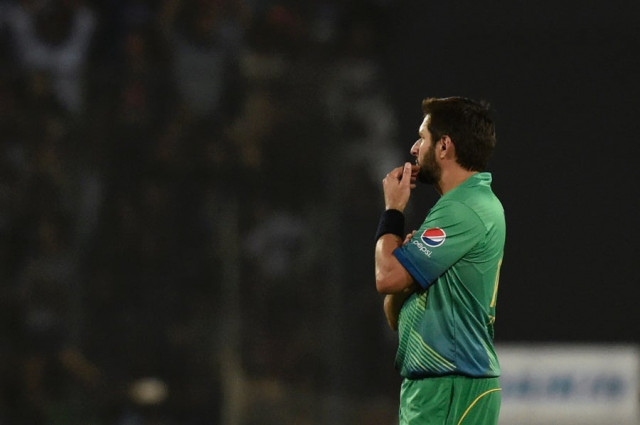Shahid Afridi's only fault
Pakistan T20I captain might be ragged but no one ever tried to iron out his faults

PHOTO: AFP
A large chunk of the T20 captain’s fan, observers and critics blame his countless appearances in advertisements. But really are his over-acted commercials for everything from shampoo to chewing gum the problem? Can't be. That can't be Shahid Afridi's biggest fault.
Where does that leave us? The second, and more judicious, school of thought targets our favourite on-field hit-man for failing time and again to play “sensible” cricket.
But wait, isn’t Chris Gayle also carved out of the same rock? Both players are often given the tremendous burden of leading their teams single-handedly past the finishing line. We hail the West Indian giant’s cricketing grandeur but still feel comfortable peddling an argument that our very own hero never played sensibly – quite diabolical.
 PHOTO: AFP
PHOTO: AFPLoved by Indian crowds more than ones back home, says Afridi
Another group scorns Shahid for his outspoken nature. Can you really blame the guy? Maybe his approach has roots in his Pashtun upbringing. The “not a penny more, not a penny less” approach is a trademark characteristic for Pashtuns. One can argue that Shahid is not only programmed to behave the way he does, but does so with pride.
Others claim Shahid is a “useless” captain and a “confused” cricketer whose decision-making skills start flailing when the scene presents a pressure situation. Naysayers assert he is driven by emotions and quote the locution which proclaims that Pashtuns are the masters of this trait. If that is so, warriors have been historically lured into battles larger than life using persuasion through emotions. Plato, in fact, refers to warriors as the “spirit and courage of society” in his masterpiece The Republic. This makes Shahid a combatant in the battlefield with bats and balls as weapons.
 PHOTO: AFP
PHOTO: AFPAfridi issues clarification for 'loved more in India than Pakistan' statement
One statistically flagrant group says a player like Shahid wouldn’t have survived in any other country’s cricket structure with such performances and numbers. Perhaps, they failed to recall the roar of the crowd when he walks out onto the pitch, even after 19 years of “failing the team and the supporters”. If he ever played for numbers then instead of hitting a lower full-toss into the hands of the deep midwicket fielder on 49, he would have steered it for a single against Bangladesh in Pakistan’s 2016 World T20 campaign opener.
So, what is Shahid’s actual fault? The answer is simple: he was born in Pakistan, a country which has failed to invest efficiently in its domestic structure.
 PHOTO: AFP
PHOTO: AFPBatsmen must play responsibly in World T20: Afridi
The word is that Pakistan has always been rich in raw talent. Pakistan cricket legends never came through a proper domestic structure where their abilities were polished to make them world beaters. Likewise, when Shahid made his international debut, he didn’t have much experience with the bat or the ball – after all, a 16-year-old barely knows what he is going to do during the day.
Since the day a young Shahid scored a 37-ball ton on his debut, he was laden with a responsibility to repeat those heroics whenever he wielded the willow. Shahid was not up for it and why should he be? No one ever told him he could or should do that. He was just a kid who walked in that day and hit everything out of the park.
 PHOTO: AFP
PHOTO: AFPI'm not fit to be Pakistan skipper: Afridi
If Pakistan had a proper leashing system, it could have helped the swashbuckling batsman to slay his demon of inconsistency. If there was a proper system in place, someone would have helped him control the urge to hit every bowler out of the park from the word go. Even if we imagine that without his uncontrolled hitting sprees, Shahid would not have been this famous; someone could have just helped him become better at hitting the short ball into the stands rather than making the cameramen play ‘find the ball’ as he skied them.
Current and former teammates reiterate that Shahid never listened to anyone when he was in the middle. They believe he was inherently programmed to ignore the repeated instructions of his fellows to not go after the bowler; but, then again, why should he listen to anyone? Did they score the fastest century on their debut? He did. He never learned the art from anyone; thus, no one was in the right position to tell him what to do. The best possible way to handle a boundary-greedy batsman should have been to tell him to go out and play his natural game but here’s the twist: during trainings and conditioning camps, his natural game should have been improved with the help of special techniques.
 PHOTO: AFP
PHOTO: AFPIf I had debuted in 2006, I wouldn't have lasted 20 years: Afridi
One fine example is the introduction of ear plugs. The world saw a different Shahid when he drowned the crowd out and focused on his batting during the five-match ODI series against New Zealand in October 2014. Pakistan lost the series 3-2 even after being 2-1 up at one point but what was different was Shahid’s consistency. He scored 51 off 61 balls in the first ODI, 27 off 14 in second, 55 off 26 in third, 49 off 25 in the fourth and 13 off 9 balls in the fifth match. One might undoubtedly call it the most consistent performance in a series from Shahid in two decades as he had an average of 41.00 – the highest for him in any five-match series he has ever played.
Prima facie the Pakistani domestic structure or even the management of the national team never provides individual attention to players, and Shahid was one of the many players who demanded that. If Pakistan need to rise from the ashes of their recent limited-overs debacle, they need to start investing in individuals. The world has moved 20 years forward, but Shahid is still the teenager who scored a quick-fire ton. Give him five more years and he will still play like he always does because the cricket board never invested in him to augment his ability to destroy bowling attacks.
 PHOTO: AFP
PHOTO: AFPWe didn't force Afridi to announce his retirement after World T20: Shaharyar
The story of Shahid’s ‘failure’ is not that of a fallen hero; instead it is the rhetoric of a systemic collapse. The cricket board is looking at yet another overhaul. A new coach and management might come and tell the players to do something different as a unit. Its high time we realise that one stick cannot be used to regulate all individuals. Each cricketer demands a different regiment of training: some might need work on their concentration, others might need counseling and some might even be fighting anxiety.
It is important that we stop blaming Shahid for being the Afridi that we have come to know and start blaming the system which, in 20 years, could not condition a player to perform consistently. We need to stop asking Shahid why he didn’t do this or that and start asking the concerned authorities that why didn’t we make more Afridis, Abdul Razzaqs and Azhar Mahmoods in an age where the T20 mind-set is dominating ODIs and even Tests.
Here is the moment Afridi is still stuck in...



















COMMENTS
Comments are moderated and generally will be posted if they are on-topic and not abusive.
For more information, please see our Comments FAQ